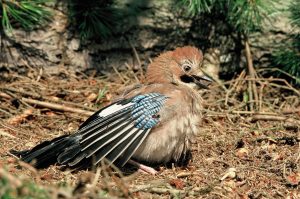Another tough breeding season for our garden birds
As I drove to work this morning I noticed that the car thermometer was only reading 5C. Pretty chilly for the end of May! What surprised me even more was that there had been a huge hail storm overnight with much of the hail still lying on the floor.
We are the lucky ones tucked up under our duvet covers at night! How does our wildlife cope with such weather extremes and at such an important time of the year when they are trying to rear young. We have seen a number of young Robin’s leave the nests in the last few days here at VHF- will they survive? The bird feeders here at VHF have been frantic due to the cold weather.
The problem for birds when the temperature drops at this time of the year is that insect populations drop, making natural food scarce at a time when the birds need more food to keep themselves warm. What is worse is that most species have broods of chicks that also want feeding. The super suet balls that we have been feeding are a particular favourite of the Starling. We believe this soft type of fat is suitable for the adult birds to take back to the young in the nests as well as offering them a quick energy boost. Our suet pellets have also been popular. We also soak sultanas at this time of the year which are pretty much exclusively eaten by the Starlings, Blackbirds and thrushes, and because of the added moisture can be fed directly to their young. However, there is one food above all that is key to helping birds at time of temperature crashes in the breeding season and this is live mealworms . A handful of Live Mealworms outside our shop here at VHF will disappear within 10 minutes on a day like today, mainly taken by Robins and House Sparrows directly back to their nests. It has been quoted that a young Blue Tit requires up to 100 caterpillars a day, and so with an average clutch size of 8-12 this makes extremely busy parents!
Our weather is due to get warmer in the next few days- hopefully in time for many of the broods that are trying to fledge in the next few days. The very wet weather in 2012 caused breeding birds huge problems with BTO data showing that many species were down on brood numbers, especially those that were in the wider countryside. Breeding birds that could visit gardens according to the BTO fared better. Let’s hope that the remainder of the 2013 breeding season is favourable!
We are the lucky ones tucked up under our duvet covers at night! How does our wildlife cope with such weather extremes and at such an important time of the year when they are trying to rear young. We have seen a number of young Robin’s leave the nests in the last few days here at VHF- will they survive? The bird feeders here at VHF have been frantic due to the cold weather.
The problem for birds when the temperature drops at this time of the year is that insect populations drop, making natural food scarce at a time when the birds need more food to keep themselves warm. What is worse is that most species have broods of chicks that also want feeding. The super suet balls that we have been feeding are a particular favourite of the Starling. We believe this soft type of fat is suitable for the adult birds to take back to the young in the nests as well as offering them a quick energy boost. Our suet pellets have also been popular. We also soak sultanas at this time of the year which are pretty much exclusively eaten by the Starlings, Blackbirds and thrushes, and because of the added moisture can be fed directly to their young. However, there is one food above all that is key to helping birds at time of temperature crashes in the breeding season and this is live mealworms . A handful of Live Mealworms outside our shop here at VHF will disappear within 10 minutes on a day like today, mainly taken by Robins and House Sparrows directly back to their nests. It has been quoted that a young Blue Tit requires up to 100 caterpillars a day, and so with an average clutch size of 8-12 this makes extremely busy parents!
Our weather is due to get warmer in the next few days- hopefully in time for many of the broods that are trying to fledge in the next few days. The very wet weather in 2012 caused breeding birds huge problems with BTO data showing that many species were down on brood numbers, especially those that were in the wider countryside. Breeding birds that could visit gardens according to the BTO fared better. Let’s hope that the remainder of the 2013 breeding season is favourable!


